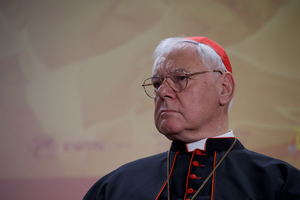‘Gaudete et Exsultate’: An Assessment
Cardinal Daniel DiNardo praises holiness document but it draws mixed reviews with some concerned about content regarding sanctity of life, heresies.

VATICAN CITY — Pope Francis’ new apostolic exhortation Gaudete et Exsultate (Rejoice and Be Glad) is being broadly praised for much of its guidance on paths to holiness — but also has been criticized for allegedly conflating the moral gravity of protecting unborn lives with other matters and making unjustified attacks on critics of the Pope.
Published April 9, the papal document emphasizes the universal call to sanctity by drawing heavily on the beatitudes, warning of the dangers of distractions, hedonism and consumerism, and singling out two particular heresies — what Francis calls modern-day Gnosticism and Pelagianism — as “subtle enemies” to becoming saints.
The Pope says his “modest goal” for the document is to “re-propose the call to holiness in a practical way for our own time, with all its risks, challenges and opportunities. For the Lord has chosen each one of us ‘to be holy and blameless before him in love.’”
“The exhortation invites us to journey toward becoming all that we are: that is holy,” said Cardinal Daniel DiNardo, the president of the U.S. Conference of Catholic Bishops, in April 11 email comments to the Register. “If we take time in prayer with the exhortation’s beautiful reflection on the Gospel and the practical advice it offers for our daily lives, it will bear much fruit to nourish us in our journey to holiness.”
Professor Joseph Seifert, president of the newly founded John Paul II Academy for Human Life and the Family, called Gaudete et Exsultate “by far the most beautiful document of this pontificate,” one in which Pope Francis “stresses truly an absolutely central part of revealed truth,” which is the call to holiness.
He also believes it to be “completely incompatible” with recent statements by some Catholic scholars that reject elements of the encyclicals Humanae Vitae and Veritatis Splendor.
But two aspects of the document have triggered debate and concern: a passage that some have interpreted as assigning equal moral standing to the defense of unborn lives and to measures that protect the poor, migrants and the marginalized; and a section in which the Holy Father seems to chastise those striving to uphold the Church’s doctrine and discipline at the expense of what he says is spreading the “beauty and joy of the Gospel and seeking out the lost.”
The Sacredness of Life
Regarding the first passage, the Holy Father says defense of the “innocent unborn needs to be clear, firm and passionate,” but adds that “equally sacred” are the lives of the “poor, those already born, the destitute, the abandoned and the underprivileged, the vulnerable infirm and elderly exposed to covert euthanasia, the victims of human trafficking, new forms of slavery, and every form of rejection.”
He then criticizes some Catholics who often view the situation of migrants as “a secondary issue” compared to “the ‘grave’ bioethical questions,” and he cites scriptural references underlining the importance of welcoming the stranger.
Cardinal DiNardo, the archbishop of Galveston-Houston, said life is “never more vulnerable than when it is in the womb,” but also “throughout our lives we need the support of our sisters and brothers.” He added that Pope Francis “passionately reminds us of this truth” and that “Jesus calls us to be courageous in service to life at every stage.”
But some pro-life groups have criticized the Pope’s words. The Susan B. Anthony List, for one, said that although the Pope appears to confirm the intrinsic evil of abortion, it is “impossible” to equate abortion with any other social-justice issue, and the passage in the exhortation, therefore, “blurs lines and causes confusion.”
In comments to the Register, Cardinal Gerhard Müller said the Pope “clearly emphasizes” the unconditional right to life from conception to natural death in the document, so it’s clearly improper to categorize Francis as an “ideologue of the anti-culture of death and ‘its liberal’ pope.”
But, quoting the Second Vatican Council decree on ecumenism, Unitatis Redintegratio, the prefect emeritus of the Congregation for the Doctrine of the Faith also stressed that “we must not forget the ‘hierarchy of dogmatic and moral truths.’” The right to life is fundamental, he said; other human rights are “subordinate to this,” and the two cannot be “played off against the other.”
Professor Claudio Pierantoni, a patristics and medieval philosophy scholar at the Universidad de Chile, said although there is “seemingly no theological error” in the Pope’s words, abortion is an “intrinsically evil action, monstrously justified” by its legalization, whereas issues such as immigration are matters of “prudential judgment.”
His view was shared by professor Roberto De Mattei, a Church historian and president of the Rome-based Lepanto Foundation, who said the Fifth Commandment prohibits the killing of the innocent, but no divine law requires welcoming the immigrant, especially when such persons harbor views antithetical to Christianity.
By contrast, Seifert believes the Pope’s words are a reminder of our obligation to extend “the same love and mercy” to the unborn to all human beings, and so the document does not “relativize the commitment for the unborn.”
Francis was also emphasizing that a central Gospel message — “What you have done to the least of my brethren, you have done also to me” — “does not apply solely to the unborn,” Seifert added.
Gnosticism and Pelagianism
The second element in the document causing vigorous debate relates to what the Pope describes as two “subtle enemies” to achieving sanctity — the heresies of Gnosticism and Pelagianism.
Today’s gnostics, he writes, “judge others based on their ability to understand the complexity of certain doctrines.” They also “reduce Jesus’ teaching to a cold and harsh logic that seeks to dominate everything.”
On contemporary pelagianism, the Pope says this involves telling the weak that “all things can be accomplished with God’s grace,” while giving the idea that “all things are possible by the human will” and failing to realize “that ‘not everyone can do everything.’”
The “new pelagians,” he continues, have an “obsession with the law,” a “punctilious concern for the Church’s liturgy, doctrine and prestige,” and “give excessive importance to certain rules,” rather than wishing to spread the “beauty and joy of the Gospel and seeking out the lost.”
The Holy Father asks that the Church be “set free” from these two heresies blocking the “path to holiness.”
Seifert criticizes Francis for vaguely identifying rigorism with orthodoxy in these passages. But Seifert hopes the “noble moral tenor” of the document as a whole indicates that Francis implicitly rejects the “new papal moral theological paradigm” of such theologians as Father Maurizio Chiodi, who recently used the Pope’s exhortation on the family, Amoris Laetitia, to argue there is nothing “intrinsically immoral” about contraception.
Others take a darker view. Pierantoni said the document has “beautiful and useful pages about holiness,” but he considers the section on Gnosticism and Pelagianism “central” to the exhortation and its “weakest and most dangerous” part.
He sees it as directed at those who adhere to “orthodox doctrine and commandments” — a “counterattack” against the cardinals who issued the dubia (a requested clarification of parts of Amoris Laetitia) and against those who issued the filial correction last year, accusing the Pope of spreading heresy, especially through Amoris Laetitia and its interpretations.
Pierantoni said such attacks on defenders of orthodoxy serve to “support the error of situational ethics,” which denies the existence of intrinsically evil acts — something he believes is the “principal heresy of our times.”
Both Pierantoni and De Mattei say the Gnostic and Pelagian characteristics Francis describes have nothing to do with true Gnostics and Pelagians but, according to De Mattei, distort “the foundations of authentic Christian spirituality.”
The pelagian, De Mattei said, is someone who believes he can be saved by his own strength, without God’s grace, whereas Francis’ definition is of someone who erroneously believes grace helps him to observe divine law in all circumstances and without exception — an “unrealistic ideal,” according to the Pope, a belief which De Mattei believes is no different from what Martin Luther thought.
Pierantoni, who noted that the Ten Commandments are never mentioned in the text, called the Pope’s use of the label “pelagian” “preposterous” and “grotesque,” as Francis applies it to people who “speak warmly of God’s grace.” As for the term “gnostic,” Pierantoni said it is “gratuitously attributed” to those who “oppose situation ethics” and who insist there are intrinsically evil acts and divine commandments that cannot be changed.
Other Perspectives
But Pope Francis biographer Austen Ivereigh believes there’s “no one more doctrinally orthodox than Francis” and that when he speaks about rigidity, the strong reaction “may well be an indication” of making “idols of the law, or of certain doctrinal or liturgical formulations.”
The Pope, he said, is calling everyone to authentic holiness, which means “challenging us to abandon our idols.”
If people are offended by that, “that’s good,” Ivereigh said, as it “means they’re listening.” He insisted the Pope “really isn’t” being hostile to those who feel offended by his words, but warning them they “might be on the wrong track and to point out the right one.”
For Cardinal Müller, “belief in the truth of the dogma of the Church, the sacramental grace of the Church, the sacrament of salvation of the world, and the Church’s divine law are not idols, but the foundations of the Catholic Church, which is the ‘pillar of truth.’”
The exhortation, he added, “becomes a blessing for the Church and serves the faith of Catholics only if the opportunists and sycophants do not hammer out elements and throw them as stones at serious believers and thus sin again against the unity of the Church.”
“Who wants to accuse the Council Fathers of dogmatism in teaching, rigorism in morality and legalism in divine law?” he asked.
“He who opposes God in unbelief and disobedience hardens his heart and closes his mind,” Cardinal Müller said. “The rigid person,” he added, “is not he who fulfills the commandments of God,” but “he who rejects them with a hard heart and proud mind.”
The Church, he stressed, is a “community of believers” witnessing to the “truth of God,” not a political party in which conservatives and progressives “struggle for power.” He said the Church needs “more communion and less conflict.”
For Cardinal DiNardo and Seifert, the document promotes this through its emphasis on the beatitudes.
They give “a marvelous brief guide to holiness,” said Seifert, adding that Gaudete et Exsultate offers an “uplifting reading” of Jesus’ Sermon on the Mount “and its insistence on the absolute moral value of the love of God and the love of neighbor, of mercy, patience, etc.”
Cardinal DiNardo called the beatitudes “the centerpiece” of the exhortation, a document that, “at its heart,” reminds us “we are sinners seeking to strengthen our faith.”
“Perfection eludes us,” the cardinal said, “but we grow in holiness by ‘trickling increments.’”
Edward Pentin is the Register’s Rome correspondent.


















